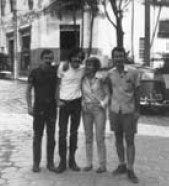Paulo Coelho: A Warrior's Life (30 page)
Read Paulo Coelho: A Warrior's Life Online
Authors: Fernando Morais
Paulo still didn’t understand. He stood up and asked, smiling: ‘Stop messing around, Raul. What are you singing?’
When he made to leave, a policeman placed a hand on his shoulder and said: ‘You’re not going anywhere. You’ve got some explaining to do.’
Paulo only had time to murmur a rapid ‘Tell my father’ to Raul before being led away. He was taken through a labyrinth of poorly lit corridors and across a courtyard until they reached a corridor with cells on either side, most of which appeared to be empty and from which emanated a
strong smell of urine combined with disinfectant. The man with him stopped in front of one of them, occupied by two young men, shoved him inside and then turned the key in the lock. Without saying a word to the others, Paulo sat down on the floor, lit a cigarette and, panic-stricken, tried to work out what could possibly lie behind this imprisonment.
He was still immersed in these thoughts when one of the men, who was younger than he, asked: ‘Aren’t you Paulo Coelho?’
Startled, he replied: ‘Yes, I am. Why?’
‘We’re Children of God. I’m married to Talita. You met her in Amsterdam.’
This was true. He recalled that during his trip to Holland, a young Brazilian girl had come up to him on seeing the Brazilian flag sewn on to the shoulder of his denim jacket. Like Paulo, the two young men had no idea why they were there. The Children of God sect, which had been started in California some years earlier, had managed to attract hundreds of followers in Brazil and now faced serious allegations, among which was that they encouraged sex with children, even between parents and their own children. The presence of the three in the Dops cells was like a snapshot of the state of political repression in Brazil. The much-feared, violent machine created by the dictatorship to confront guerrillas was now concerned with hippies, cannabis users and followers of eccentric sects.
It wasn’t until about six in the evening that a plainclothes policeman with a pistol in his belt and holding a cardboard folder in his hand opened the door of the cell and asked: ‘Which one of you is Paulo Coelho de Souza?’
Paulo identified himself and was taken to a room on the second floor of the building, where there was only a table and two chairs.
The policeman sat on one of them and ordered Paulo to sit in the other. He took from the folder the four-page comic strip that accompanied
Krig-Ha, Bandolo!
and threw it down on the table. Then he began a surrealist dialogue with the prisoner.
‘What kind of shit is this?’
‘It’s the insert that accompanies the album recorded by me and Raul Seixas.’
‘What does
Krig-Ha, Bandolo!
mean?’
‘It means “Watch out for the enemy!”’ ‘Enemy? What enemy? The government? What language is it written in?’ ‘No! No, it’s not against the government. The enemy are African lions and it’s written in the language spoken in the kingdom of Pal-U-Don.’
Convinced that this skinny, long-haired man was making a fool of him, the policeman looked as if he was about to turn nasty, thus obliging Paulo to explain carefully that it was all a work of fiction inspired by the places, people and language of the Tarzan cartoons which were set in an imaginary place in Africa called Pal-U-Don.
The man was still not satisfied. ‘And who wrote this stuff?’
‘I did, and my partner, who’s an architect, illustrated it.’
‘What’s your partner’s name? I want to interview her too. Where is she now?’
Paulo panicked at the thought of involving Gisa in this nightmare, but he knew that there was no point in lying; nor was there any reason to lie, since they were both innocent. He looked at his watch.
‘Her name is Adalgisa Rios. We were invited to supper this evening at my parents’ house. She should be there by now.’
The policeman gathered up the papers, cigarettes and lighter he had scattered on the table, got up and ordered the terrified prisoner to follow him, saying: ‘Right, let’s go. Let’s go and find your old lady.’
As he was being bundled into a black-and-white van bearing the symbol of the Rio de Janeiro Security Police, Paulo felt momentary relief. This meant that he had been officially arrested and, in theory at least, was under state protection. Hell meant being picked up in unmarked cars with false number plates by plainclothes policemen, men with no orders and no official mandate, and who had been linked with many cases of torture and with the disappearance, so far, of 117 political prisoners.
His parents could hardly believe it when they saw their son get out of the car, surrounded by four armed men. They said that Gisa had not yet arrived and wanted to know what was going on. Paulo tried to calm them down, saying that it was just a minor problem with
Krig-Ha, Bandolo!
It would soon be resolved, and he and Gisa should even be back in time for dinner.
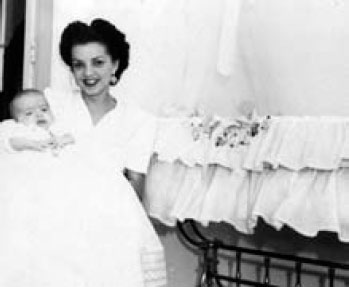
Lygia Araripe Coelho de Souza holding her baby Paulo, Rio de Janeiro, 1947.
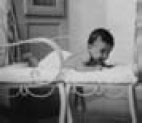

Paulo as a baby and playing with his cousins (in sandals and shorts), Rio de Janeiro, 1950s.
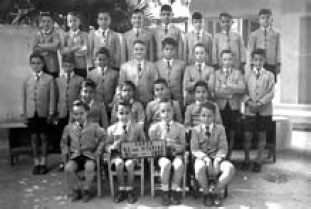
Paulo, aged ten (second from left, first row), at Our Lady Victorious School, Rio de Janeiro, 1957.

Paulo, aged fifteen (fourth from left, second row from top), at St Ignatius College, a respected boys’ schools in Rio de Janeiro, in 1962.
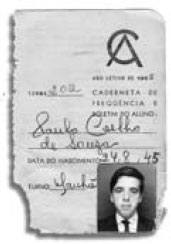
The forged school document Paulo used to get into the left-leaning ‘Paissandu set’ in 1965. Adding two years to his age gained him admittance to this group of intellectual film-lovers.
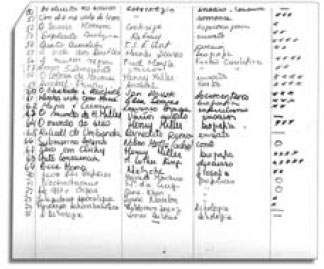
Paulo used to classify and rank the books he read. In this list, Martin Luther King wins his highest rating.

Fabíola Fracarolli in 1967, one of Paulo’s many girlfriends during the late 1960s.
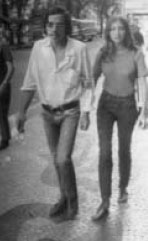
Paulo and Fabíola.
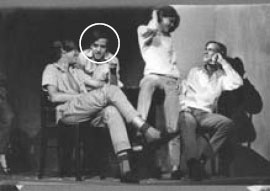
Paulo with fellow actors in an adaptation of Jorge Amado’s
Capitães da Areia
at the Teatro Serrador in Rio de Janeiro, 1966.
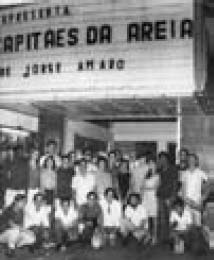
Paulo (fifth from the left, front row) with cast and crew on the opening night of
Capitães da Areia
.

Paulo as Captain Hook (far right) and the other actors in his production of
Peter Pan
, 1969. Fabíola, who subsidised the production, played Peter Pan and Paulo’s friend Kakiko (centre, front row) wrote the score.
